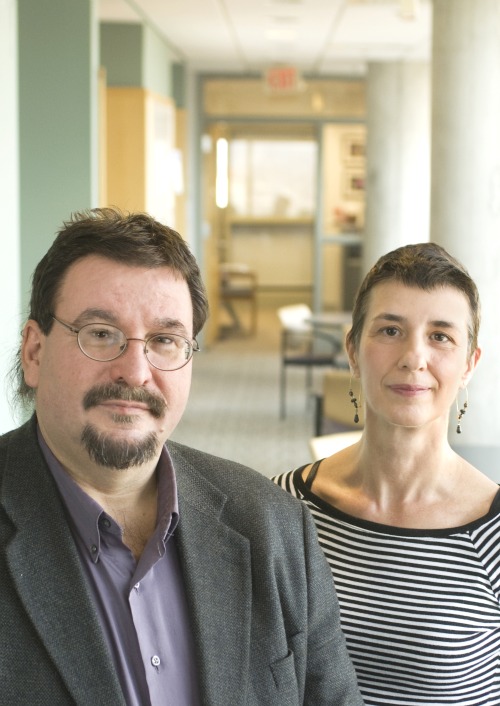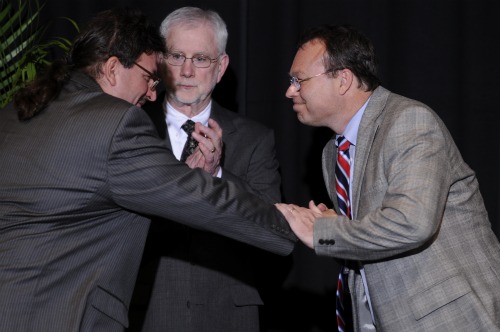
I arrived in the states 21 years ago as a student, from what was to become the war-torn country of Yugoslavia. Twenty-one years later I am holding a title of James G. Blakemore Chair and vice chair for basic science research at the Department of Psychiatry at one of the most prestigious universities in the world. It is just incredible, isn’t it?
So, how did it happen? Was it my skill, personality, dedication, ideas, luck? Perhaps in part, but there is much more to it.
When I look at my career, it is clear to me that scientific success it is not an individual achievement. Just as Vanderbilt University Medical Center is upheld by five “pillars” (its people, service, quality, growth and finance, and innovation), my career also rests on a number of critical supporting beams: mentors, colleagues, co-workers, family, organization and society.
Pillar 1: Mentors
Mentors infused me with my love of science, curiosity and opened my mind. They taught me to be patient, to try to understand the “big picture.” And they put up with my less-than-sophisticated (and sometimes outright dumb) ideas and questions, having faith that I would grow into a thoughtful researcher. Without them, I wouldn’t know how to do good science or how to love my work.
Pillar 2: Colleagues
Over the years, colleagues shared ideas and resources with me, critiqued my work and helped me polish my projects. We agonized over ideas, discussed different views and passionately argued our points. In this process we became more than colleagues; we became friends. Without them, I could not grow as a researcher.
Pillar 3: Co-workers
Research is a team endeavor and good ideas can come from anyone on the research team. I had the privilege of working with many wonderful postdoctoral and pre-doctoral trainees over the years. My lab members always gave their hearts and souls to the pursuit of the most intriguing questions of biological psychiatry. Without them, there would be no results or discovery.
Pillar 4: Family and friends
I deeply believe that a happy researcher is the most productive researcher. And the most important source of happiness is a fulfilling family life, a home that can help overcome all the challenges that life and research endeavors can throw at you. My wife has always been an invisible partner in my scientific endeavors, a source of love, steadiness and strength when things were bleak and when I considered giving up my research career. My children have always been always an endless supply of joy, and their unconditional love taught me how to be a better person. Without them, success would not be worth anything.
Pillar 5: Organization

It is not enough to be an excellent researcher, but someone has to recognize value and achievement. And I believe that Vanderbilt is unique in this regard. I did not have to demand promotion and threaten to leave to be named to an endowed professorship. The leaders of our organization felt that the quality of my work and my involvement in the life of the Vanderbilt community were an asset and that this warranted a reward. I know very few institutions around the world that function this way, and I am proud to be a part of this community. Without a great organization, there would be no progress.
Pillar 6: Society
There is no more welcoming and inclusive society than the United States. This is the only society that allows foreign students, without any backing or power, to rapidly rise through a merit-based system. The NIH funded my projects, caring only about the quality of the science I proposed, and the philanthropists never cared about my ethnic origins, either. Furthermore, regardless of my accent, peculiar European habits and different views on life, I was always welcomed as part of the community – from the University to the local chess club or school PTA.
In summary, being a smart and hardworking lad is not enough to become successful – someone has to groom you, support you, perform the work with you, invest in you and recognize your achievements. So, as we appoint our new endowed chairs, we are celebrating our community spirit, our joint achievements, our university, and our society that made all this possible.
Karoly Mirnics is James G. Blakemore Chair in Psychiatry and professor and vice chair for basic science research. Visit Dr. Mirnic’s laboratory.
Read about the other Vanderbilt faculty honored with endowed chairs May 17, 2011.